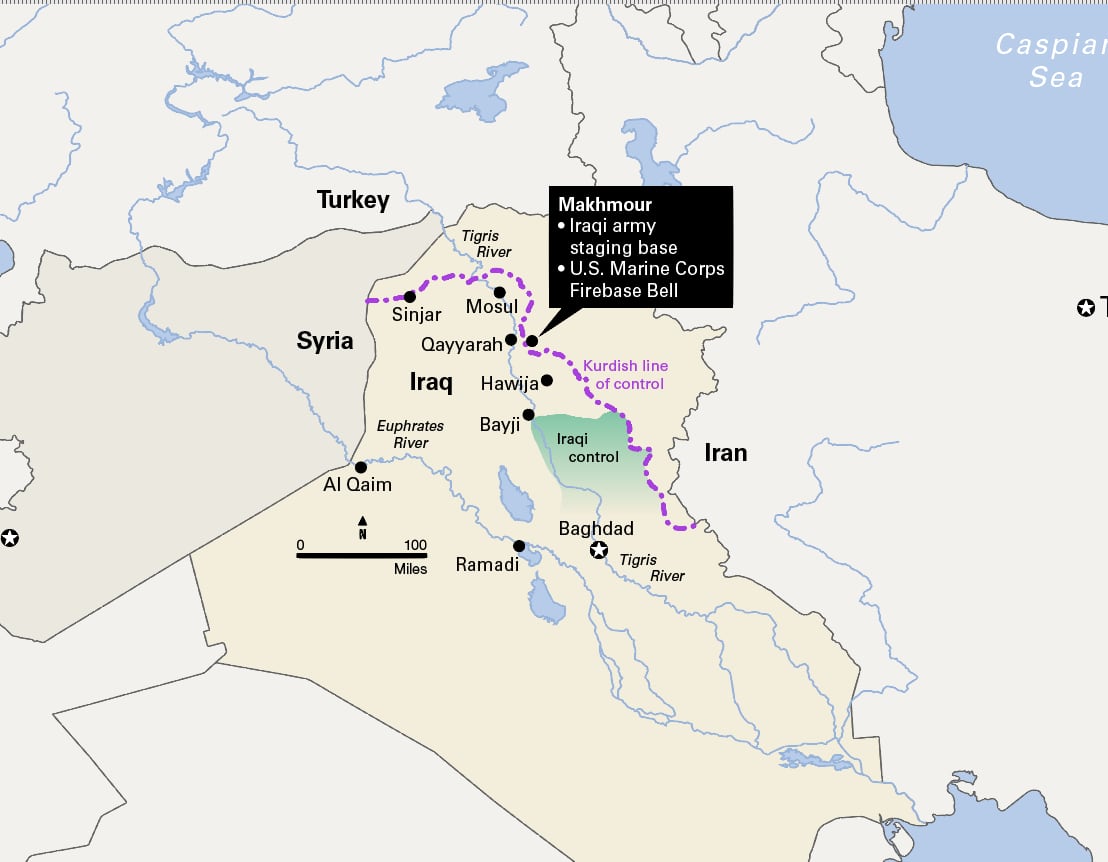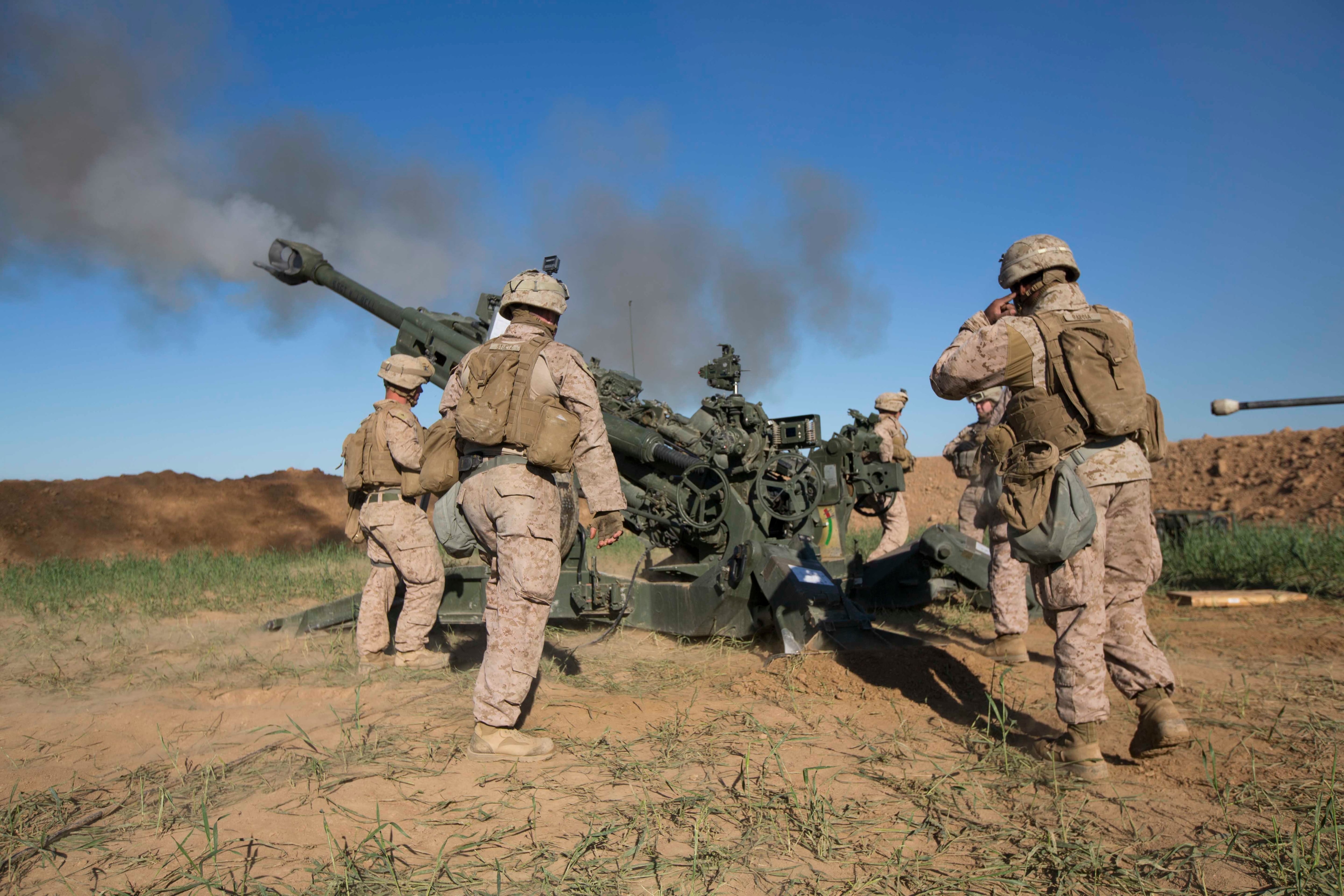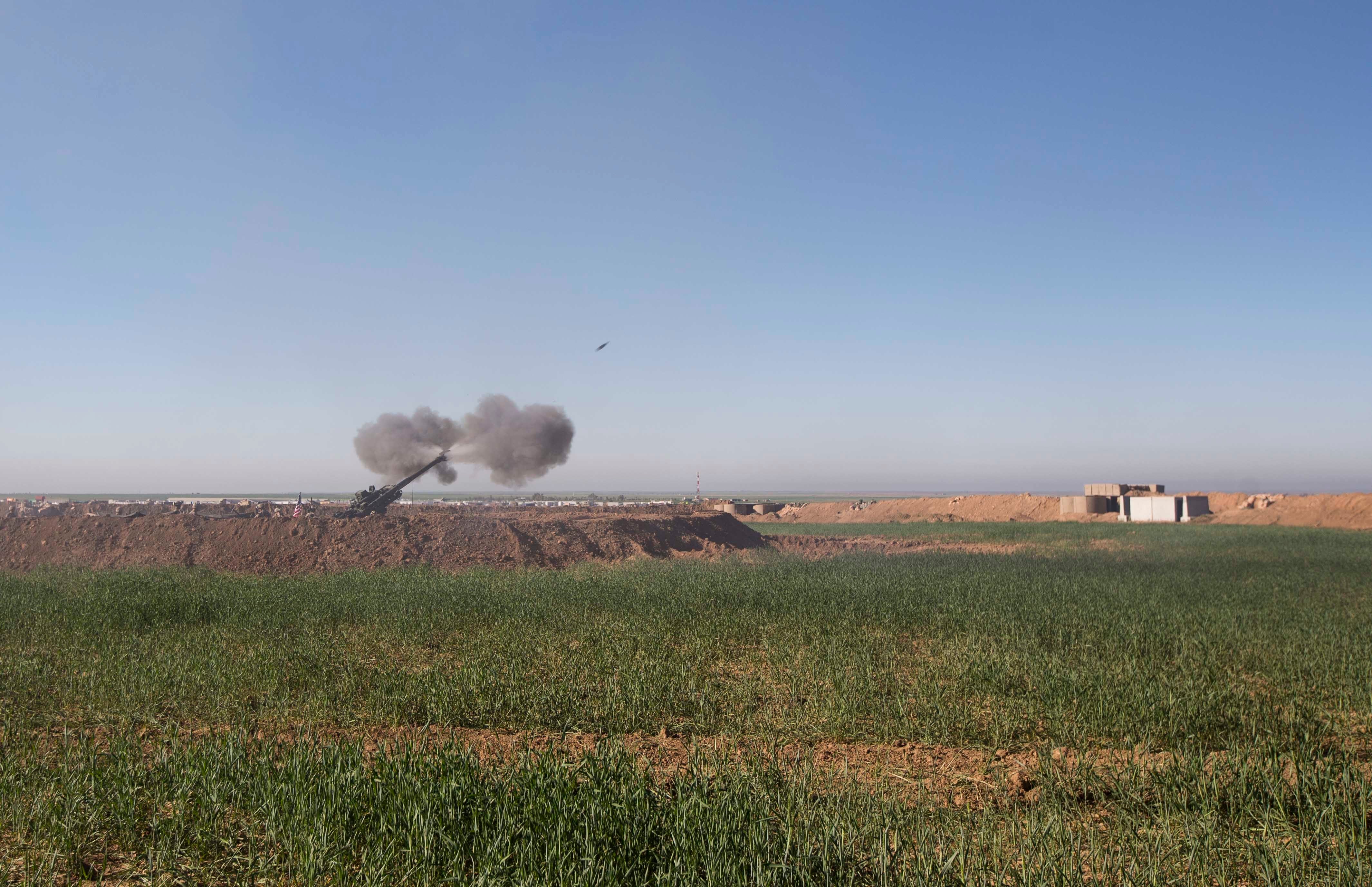Day-to-day life in Iraq is busy for the 100-plus U.S. Marine artillerymen who are forward deployed at a firebase near the Islamic State group's front lines southeast of Mosul.
"They fire every day in support of Iraqi maneuvers," Army Col. Steve Warren said of the firebase near the Kurdish-controlled city of Makhmour.
"They fire anything from high explosives to suppress the enemy, to smoke to screen friendly movement, to illumination rounds to help patrol in the evenings. So they are fully engaged," Warren, a Baghdad-based Defense Department spokesman, told reporters Thursday.
For now, the base, informally known as "Firebase Bell," is a one-of-a-kind operation for U.S. troops in Iraq. But top military officials say there may soon be more troops setting up similar outposts to provide advancing Iraqi combat units with offensive fire support for operations around the Islamic State stronghold of Mosul.
Last month fewer than 200 Marines set up the outpost, which has at least four M777A2 howitzer artillery guns. It marked the first time since U.S. forces returned to Iraq in 2014 that Americans have set up a quasi-permanent presence on the ground outside the perimeter of a major Iraqi military installation. The firebase is about 15 miles from territory controlled by the Islamic State group, also known as ISIS or ISIL.

The Iraqi army has begun its campaign to clear the Islamic State stronghold of Mosul. Phase One calls for retaking areas between Makmour and Qayara, which would cut the supply lines to Bayji and Hawija.
Photo Credit: John Bretschneider/Staff Source: Staff research, The Associated Press
The Marines are supporting the Iraqi army's new operation to push the ISIS front west and seize key terrain along the Tigris River south of Mosul, the militant group's primary stronghold in Iraq.
Pentagon officials say there may be more situations where the U.S. would either open a base or reopen one that was used in the earlier Iraq war.
"As Iraqi security forces progress toward isolating Mosul, there may be a situation in which there is another base," said Rear. Adm. Andrew Lewis, Joint Staff's vice director for operations.
Additional outposts would provide artillery fire from behind the front lines, Lewis said Wednesday.
"Their mission is to provide fires and support of Iraqi forces, just like we do with airplanes, just it's surface-to-surface fires versus air-to-surface fires," he said. "Same concept, very accurate."
The Marines' firebase is located very close to other Iraqi military facilities near the town of Makhmour, where the Iraqi army has been amassing large combat units in preparation for operations around Mosul.
The Marines there have faced repeated attacks from ISIS fighters using long-range weaponry or who infiltrate into areas near the firebase.
A rocket attack killed Marine Staff Sgt. Louis F. Cardin on March 19, just several days after the Marines arrived at the small base. Cardin and the other Marines there were part of the 26th Marine Expeditionary Unit, which is currently deployed aboard the USS Kearsarge, an amphibious assault ship in the U.S. Central Command region.
But direct attacks on Firebase Bell have dropped off during the past couple of weeks as the Iraqis have pushed west and attacked several ISIS-controlled villages, Warren said.
"The enemy is being pressured in a much more close fight, which has resulted in a significant reduction in the longer-range rockets that they fired" at the firebase, Warren said.
Officially the firebase is known as the Karasoar Counterfire Complex.

U.S. Marines with Task Force Spartan, 26th Marine Expeditionary Unit (MEU), on Firebase Bell, Iraq, fire an M777A2 Howitzer at an ISIS infiltration route March 18, 2016.
Photo Credit: Cpl. Andre Dakis/Marine Corps
The Marines are supporting an Iraqi-led offensive that began on March 24 and has made slow and limited progress. The Iraqi units have struggled to seize the small ISIS-controlled village of al Nasr.
"They're in this kind of back-and-forth over Nasr. They've advanced. They've withdrawn. And now they're in the process of advancing again," Warren said.
The Iraqis main goal for the current operation is to seize a patch of territory along the Tigris River south of Mosul, which would cut one of ISIS's key supply lines between Mosul and its territory to the south and east.
A spate of local reports from the front near Makhmour and Nasr suggest the Iraqis units have suffered from some desertions and some forward-deployed infantry troops are not fighting aggressively.
Warren downplayed those reports and noted that these Iraqi units are seeing combat for the first time.
"There's always going to be some 'getting your legs under you' and that is what we're seeing now," he said.
Andrew Tilghman is the executive editor for Military Times. He is a former Military Times Pentagon reporter and served as a Middle East correspondent for the Stars and Stripes. Before covering the military, he worked as a reporter for the Houston Chronicle in Texas, the Albany Times Union in New York and The Associated Press in Milwaukee.




